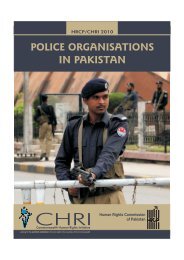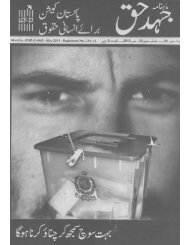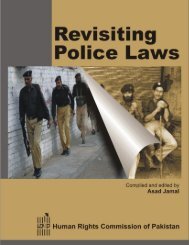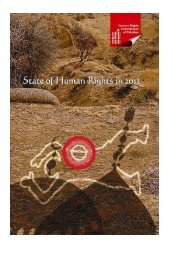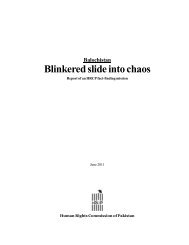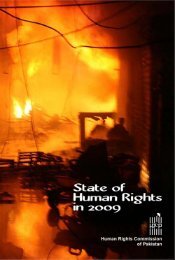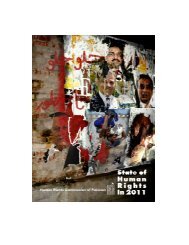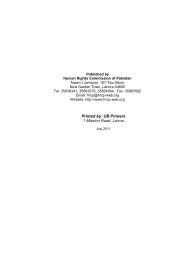Download PDF file - HRCP
Download PDF file - HRCP
Download PDF file - HRCP
You also want an ePaper? Increase the reach of your titles
YUMPU automatically turns print PDFs into web optimized ePapers that Google loves.
<strong>HRCP</strong> fact-finding missions’ report 63<br />
government had given some money for reconstruction. The community did not consider itself targeted though it<br />
shared the feeling of insecurity of the rest of the population. Forced conversions were not an issue. The community<br />
considered itself part of the Baloch struggle for their rights.<br />
The Christian community at Khuzdar complained of domicile problems and discrimination in many areas. They<br />
were too poor to claim social rights and got only low-paid jobs. When government quarters were repaired their<br />
quarters were ignored. They apprehended qabza over their graveyard. Their demand for a colony of their own had<br />
not been accepted. However, they praised the climate of religious tolerance which had not been affected even by the<br />
war in Afghanistan.<br />
The representatives of the 50 odd non-Muslim families in Loralai did not mention any serious problem. They said<br />
relations with the majority community were peaceful and amicable. They had their places of worship and managed<br />
their affairs in a climate of harmony. In 1992 a Hindu neighbourhood was attacked in the wake of the Babri Mosque<br />
demolition. Six persons were killed, about 15 houses were burnt and valuables looted. The local Muslims helped in<br />
the recovery of jewellery and money but the government failed to pay the compensation it had promised.<br />
Women<br />
The woman in Turbat appeared to enjoy more freedom than elsewhere in the country, but their social rights<br />
seemed restricted as elsewhere. Restrictions on mobility were compounded by deficiencies in the transport system.<br />
Forced marriages were not uncommon. Segregation was not a part of the traditional culture but the trend in its favour<br />
had become stronger over the recent past due to the growing influence of extremist clerics. One of the consequences<br />
of this trend was curtailment of economic opportunities for women.<br />
The oppression of the Sardari system was more pronounced in Khuzdar. Forced marriages and child marriages<br />
were reported to be common, education and employment opportunities for women were extremely limited. No<br />
woman participated in any of the meetings the <strong>HRCP</strong> team held in Khuzdar. Registration of marriage was not a<br />
practice in Turbat, <strong>HRCP</strong> was told.<br />
At Khuzdar, too, <strong>HRCP</strong> was told that segregation of women was a relatively new trend. Women’s major concerns<br />
were said to be denial of social rights, clerics’ opposition to girls’ education, child marriages and lack of employment<br />
opportunities.<br />
In Loralai, women were invisible in social life.<br />
Workers<br />
The trade unionists in Khuzdar criticised the IRO and complained of absence of consultation with Baloch unions.<br />
The workers were denied rights allowed by law and terms of employment were arbitrarily determined by the employers.<br />
Many irregularities in the mining sector were pointed out. The employers were not making their contribution to joint<br />
funds and the workers’ welfare fund was dormant. Contract labour (not local) was employed and use of bonded<br />
labour system was alleged.<br />
Unemployment<br />
At all places visited by the <strong>HRCP</strong> teams, the problems caused by unemployment and lack of employment opportunities<br />
were highlighted.<br />
At Turbat and Tump <strong>HRCP</strong> was told that many graduate and matriculate men and women had been seeking<br />
employment in vain.<br />
A 70-member association in Khuzdar working for the people’s right to work mentioned many problems faced by<br />
the jobless. The officials were indifferent to the plight of the unemployed. The Bait-ul-Mal declined them help while<br />
it dispensed charity allegedly on lists of bogus claimants. Promises of employment by the military rulers had not been<br />
honoured.<br />
Social and cultural rights<br />
Education<br />
For the people of Turbat lack of educational facilities was the most critical denial of their basic rights. 52 villages<br />
were said to be without schools. The budget, staff and education facilities at colleges and schools were considered<br />
inadequate. Some people complained that although the Federal Education Minister was from their area they had not



